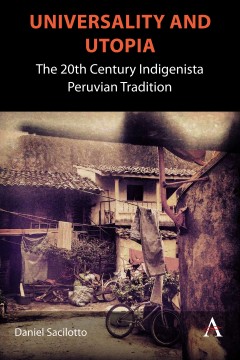Universality and Utopia
The 20th Century Indigenista Peruvian Tradition
By Daniel Sacilotto
Other Formats Available:
E-Book- About This Book
- Reviews
- Author Information
- Series
- Table of Contents
- Links
- Podcasts
About This Book
Universality and Utopia explores the intersection between philosophical universalism and revolutionary politics in twentieth-century Peruvian indigenista literature. It traces a tradition of thought whose basic tenets originate in the philosophical works of José Carlos Mariátegui and are subsequently elaborated in the literary works of César Vallejo and José MaríaArguedas. My central thesis is that, more than a “regionalist” or “provincialist” literature that describes the social reality and historic oppression of the rural Indian since colonial times, the socialist indigenismo is continuous with the invention of a utopian imaginary for a project of alternative modernity, through which urban intellectuals, artists and activists conceived of a national future beyond that of capitalist modernization. Above all, such a future would traverse the prescient division between the urban mestizo and the Indian, and finally the lingering disparity between the nation’s Western and native heritage. In doing so, indigenista writers did not only adapt the tenets of socialist philosophy and avant-garde aesthetics to describe their unique social realities and thinking of the possibility of an emancipatory political practice; they also interrogated the foundations of European Marxism, expressing various figurations of the emancipatory process to come, and different models for the new revolutionary subjectivity that would aid this transition.
Rejecting assimilation into Western modernization within the urban milieu (“acculturation”) under liberal capitalism imagined by liberal writers—such as Manuel González Prada and ClorindaMatto de Turner, in the late nineteenth century—I argue that the twentieth-century socialist indigenista tradition anticipated a bilateral process of appropriation and mediation between the rural Indian and mestizo, integrating indigenous as well as Western cultural and economic forms. In the first chapter, I assess Mariátegui’s heterodox “Peruvian socialism,” tracing the articulation of a nascentindigenista aesthetics to an emancipatory politics as part of an “active philosophy” driven by what the author names “creative antagonism.” In the second chapter, I explore how César Vallejo’s “materialist poetics” progressively extend the nationalist destiny and social realist aesthetic avowed by Mariátegui onto an internationalist and geopolitical horizon, as part of an “aesthetics of transmutation” that coincides with a plea for humanity as a whole. In the third chapter, I trace how José MaríaArguedas’ novels attempt to reconcile what he named “the magical and rational conceptions of the world,” extending the ideal of a transcultural mediation between the rural Indian and urban mestizo to conceive of a new collectivist and cooperativist ethics of “labor for-itself,” informed by his anthropological and ethnographic research. In the fourth chapter, I propose a general retrospective of the aims and limitations of the ideals guiding this tradition, considering the development of Peruvian indigenista literature after Arguedas, interrogating the legacy and prospects of emancipatory politics in response to the limits of neoliberal capitalism and the crisis of democracy in Latin America today.
Reviews
In his daring and groundbreaking study, Daniel Sacilotto navigates the political theory of José Carlos Mariátegui, the poetic vision of César Vallejo, and the narrative anthropology of José María Arguedas to argue that their seminal engagements with the unemancipated indigenous peoples of the Andes is not a closed chapter for Peruvian history, but a promising corpus to address urgent historical predicaments, and to imagine the possible in our fragmented political present writ large.
“Bold, lucid, and convincing, Sacilotto’s Universality and Utopia shows how Peruvian indigenismo makes its own the lexicon of Left universalism . A historically grounded argument that can also be translated beyond its local context, Universality and Utopia is not only a major contribution to studies of Latin American literary-political culture, but an important contribution to the philosophy of political internationalism” — Jacques Lezra, Distinguished Professor, University of California–Riverside
“Explores imaginaries of emancipation against horizons of Indigenism, international socialism, and national integration in the works of three key twentieth-century Peruvian thinkers: essayist José Carlos Mariátegui, poet César Vallejo, and novelist José María Arguedas. Lucidly composed and subtly argued, Universality and Utopia renders the complexity and rigor of Peruvian literary-political imaginings with uncommon clarity and insight” — Michelle Clayton, Associate Professor of Hispanic Studies and Comparative Literature, Brown University.
Author Information
Daniel Sacilotto is a professor of critical studies at the California Institute of the Arts, and PhD in comparative literature from the University of California, Los Angeles.
Series
Anthem Studies in Latin American Literature and Culture
Table of Contents
List of Figures; Introduction: The Question of Indigenismo and the Socialist Imaginary; José Carlos Mariátegui’s Critique of Liberalism: From Acculturation to Revolution; From Existential Despair to Collective Jubilation: César Vallejo’s Materialist Poetics; The Light within the World: José María Arguedas and the Limits of Transculturation; The Contemporary Scene: The Future of Indigenismo and the Collapse of the Integrative Dream after Arguedas; Bibliography/Cited Works; Index
Links
Stay Updated
Information
Latest Tweets



